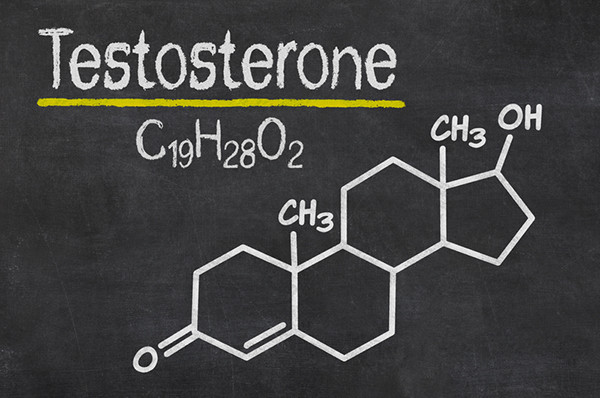How Testosterone Affects Your Weight and How to Lose Fat and Gain Muscle

Understanding the Role of Testosterone in Body Composition

Testosterone, a hormone primarily associated with masculinity, plays a critical role in body composition. It is produced in the male testes, but also present in smaller amounts in females. Testosterone affects various aspects of the body, including muscle growth, fat distribution, bone density, and even mood. Understanding the role of testosterone in body composition is crucial for both men and women who are looking to optimize their physical health.
When it comes to muscle growth, testosterone has a profound impact. This hormone stimulates protein synthesis in muscle cells, leading to an increase in muscle mass and strength. Additionally, testosterone promotes the production of red blood cells, enhancing oxygen delivery to muscles during exercise. The combination of increased muscle protein synthesis and improved oxygen supply results in more efficient muscle growth and greater athletic performance. In contrast, low testosterone levels can contribute to muscle loss and decreased strength, making it vital to maintain optimal hormone balance for overall body composition.
The Relationship Between Testosterone Levels and Weight Gain
Testosterone, the primary male sex hormone, plays a crucial role in regulating various aspects of the male reproductive system. However, its influence extends far beyond sexual function. Recent research has shed light on the relationship between testosterone levels and weight gain in men.
Low levels of testosterone have been associated with an increased risk of weight gain and obesity. Several studies have shown that men with low testosterone levels often have a higher body mass index (BMI) and a greater amount of body fat compared to those with adequate testosterone levels. Furthermore, it appears that the distribution of fat in the body is influenced by testosterone – low levels have been linked to an accumulation of visceral fat, which is the type of fat that surrounds organs and contributes to the development of chronic diseases such as diabetes and heart disease.
Understanding the impact of testosterone on weight gain is crucial for addressing the growing prevalence of obesity among men. Further research is needed to explore the mechanisms underlying this relationship and to elucidate whether testosterone therapy can effectively mitigate weight gain in men with low testosterone levels.
Exploring the Impact of Testosterone on Fat Loss
When it comes to fat loss, testosterone plays a significant role in influencing the overall process. Testosterone, often referred to as the “male hormone,” is not only responsible for male sexual development but also affects muscle growth and body composition. Studies have shown that higher levels of testosterone can contribute to the reduction of body fat, particularly visceral fat, which is commonly associated with various health risks such as heart disease and diabetes.
One way in which testosterone affects fat loss is by increasing basal metabolic rate (BMR). BMR is the number of calories your body needs to perform basic functions, such as breathing and digestion, at rest. Testosterone promotes lean muscle mass development, which in turn increases BMR. Higher BMR means more calories burned even when you’re not physically active, making it easier to create a calorie deficit and therefore lose fat.
Furthermore, testosterone influences fat metabolism by enhancing fat oxidation. Fat oxidation refers to the process in which your body breaks down stored fat and converts it into energy. Studies have shown that individuals with higher testosterone levels demonstrate greater fat oxidation rates, leading to more efficient fat loss. This effect can be particularly beneficial for individuals looking to reduce stubborn belly fat, as testosterone promotes visceral fat breakdown.
While testosterone plays a vital role in fat loss, it’s worth noting that the impact may vary based on individual factors such as age, genetics, and overall hormonal balance. Maintaining a healthy lifestyle, including a balanced diet and regular physical activity, is essential for optimizing testosterone levels and maximizing fat loss potential. In the next section, we will explore the specific diet and nutrition strategies that can support testosterone production and enhance fat loss.
How Testosterone Influences Muscle Growth
Testosterone, a hormone primarily produced in the testicles, plays a crucial role in muscle growth and development in men. This hormone is responsible for stimulating protein synthesis within muscle cells, which leads to an increase in muscle mass. Additionally, testosterone enhances the production of Insulin-like Growth Factor-1 (IGF-1), another important factor in muscle growth.
Research suggests that higher testosterone levels are associated with increased muscle protein synthesis and a greater ability to gain lean muscle mass. In fact, a study published in The Journal of Clinical Endocrinology & Metabolism found that young, healthy men who received testosterone injections experienced a significant increase in muscle size and strength compared to those who received a placebo.
Moreover, testosterone also promotes the activation of satellite cells, which are dormant cells located around muscle fibers. When activated, these satellite cells contribute to muscle repair and growth. This process allows muscles to recover faster and adapt to resistance exercise more efficiently, leading to increased muscle growth over time.
While testosterone plays a significant role in muscle growth, it’s important to note that individual differences in hormone levels can affect the response to training. Factors such as genetics, age, lifestyle, and overall health can impact testosterone production and utilization. Therefore, it is crucial to adopt a comprehensive approach that includes proper nutrition, regular exercise, and adequate rest to optimize muscle growth.
The Importance of Hormonal Balance for Weight Management
Hormonal balance plays a crucial role in weight management, particularly when it comes to the hormone testosterone. Testosterone is predominantly known as a male hormone, but it is also produced in smaller amounts by women. This hormone is responsible for various functions in the body, including muscle development, metabolism, and fat distribution.
When testosterone levels are in balance, it can help support weight management by promoting muscle growth and fat loss. Adequate levels of testosterone contribute to increased muscle mass, which can enhance the body’s metabolic rate and help burn calories more efficiently. Additionally, testosterone aids in the regulation of fat distribution, preventing excess fat accumulation, especially around the abdominal area.
Apart from its impact on body composition, testosterone also plays a role in appetite regulation and energy levels. It can influence satiety levels, helping to control cravings and prevent overeating. Moreover, testosterone is involved in the production of red blood cells, which transport oxygen to the muscles during exercise, promoting endurance and overall physical performance.
Ensuring hormonal balance to support weight management involves various factors, including proper nutrition, regular exercise, and healthy lifestyle choices. It is essential to maintain a balanced diet that includes an adequate intake of proteins, healthy fats, and micronutrients. Regular physical activity, including both cardiovascular exercises and strength training, can help optimize testosterone levels and improve body composition. Adequate sleep, stress management, and avoiding excessive alcohol consumption are also important for maintaining hormonal balance and supporting weight management.
*Note: This section provides general information based on scientific knowledge. For personalized advice or information specific to your situation, it is recommended to consult with a healthcare professional.
Factors That Can Affect Testosterone Levels
Factors That Can Affect Testosterone Levels
1. Age: Testosterone levels naturally decline with age, typically starting around the age of 30. This decline is known as andropause or male menopause. While this decrease in testosterone is a normal part of aging, certain lifestyle factors can accelerate this decline.
2. Obesity: Excess body fat, particularly around the waistline, has been shown to be strongly correlated with lower testosterone levels. Adipose tissue, or fat cells, can convert testosterone into estrogen, leading to hormonal imbalances. Additionally, obesity is often associated with insulin resistance, which can further impair testosterone production. Maintaining a healthy body weight through proper diet and exercise is crucial for optimizing testosterone levels.
3. Chronic stress: Prolonged exposure to stress can have detrimental effects on testosterone production. Stress triggers the release of cortisol, a hormone that can suppress testosterone synthesis. In addition, stress can disrupt sleep patterns, further contributing to hormonal imbalances. Employing stress-management techniques, such as mindfulness meditation or regular physical activity, may help mitigate the negative impact of chronic stress on testosterone levels.
4. Lack of physical activity: Leading a sedentary lifestyle can contribute to lower testosterone levels. Regular exercise, particularly resistance training, has been shown to stimulate testosterone production. Engaging in activities like weightlifting or high-intensity interval training (HIIT) can help boost testosterone levels naturally. It is important to note that excessive exercise or overtraining may actually have the opposite effect, so finding a balance is key.
Diet and Nutrition Strategies to Support Testosterone Production
When it comes to testosterone production, diet and nutrition play a crucial role. Certain nutrients are known to support testosterone production, while others may hinder it. Including a variety of foods in your diet can help ensure you get the necessary nutrients to support healthy testosterone levels.
One nutrient that has been linked to testosterone production is zinc. Zinc is commonly found in foods like oysters, beef, and pumpkin seeds. Studies have shown that men with low levels of zinc tend to have lower testosterone levels, while supplementing with zinc has been found to increase testosterone levels in zinc-deficient individuals. Another important nutrient is vitamin D, which is produced naturally in the body when the skin is exposed to sunlight. However, vitamin D deficiency is quite common, and low levels have been associated with decreased testosterone levels. Foods rich in vitamin D include fatty fish like salmon, fortified dairy products, and egg yolks.
In addition to specific nutrients, it’s also important to maintain a balanced and healthy diet overall. This means focusing on whole, nutrient-dense foods and avoiding excessive processed foods and sugars. A diet rich in fruits, vegetables, lean proteins, and healthy fats can provide the necessary building blocks for optimal testosterone production. It’s worth noting that excessive calorie restriction can also negatively impact testosterone levels, so it’s important to ensure you’re consuming enough calories to support your body’s needs. Consultation with a healthcare professional or a registered dietitian can provide personalized guidance on developing a diet plan that supports testosterone production.
Exercise and Physical Activity for Optimizing Testosterone Levels
Regular exercise and physical activity play a crucial role in optimizing testosterone levels in men. Numerous studies have shown the positive correlation between physical activity and testosterone production. Engaging in both aerobic and resistance training exercises has been found to have significant effects on testosterone levels.
Aerobic exercises such as running, cycling, or swimming can help in reducing body fat and improving overall cardiovascular health. This, in turn, can have a positive impact on testosterone levels. Engaging in moderate to high-intensity aerobic exercises for at least 150 minutes per week is recommended for optimizing testosterone production.
Resistance training, on the other hand, involves activities like weight lifting or bodyweight exercises. These exercises target muscles and stimulate the production of testosterone. Incorporating compound exercises such as squats, deadlifts, or bench presses into your workout routine can be particularly effective in boosting testosterone levels. Aim for at least two to three days of resistance training per week, with proper rest periods between sessions to allow for muscle recovery.
It’s important to note that overtraining or excessive exercise can actually have a negative impact on testosterone levels. Finding the right balance between intensity and recovery is crucial. Consulting with a fitness professional or a healthcare provider can help design an exercise program tailored to your specific needs and goals.
• Regular exercise and physical activity are important for optimizing testosterone levels in men.
• Numerous studies have shown a positive correlation between physical activity and testosterone production.
• Engaging in both aerobic and resistance training exercises can significantly impact testosterone levels.
• Aerobic exercises like running, cycling, or swimming can reduce body fat and improve cardiovascular health, leading to increased testosterone levels.
• It is recommended to engage in moderate to high-intensity aerobic exercises for at least 150 minutes per week.
• Resistance training activities such as weight lifting or bodyweight exercises stimulate the production of testosterone by targeting muscles.
• Compound exercises like squats, deadlifts, or bench presses are particularly effective in boosting testosterone levels.
• Aim for at least two to three days of resistance training per week with proper rest periods for muscle recovery.
• Overtraining or excessive exercise can have a negative impact on testosterone levels, so finding the right balance is crucial.
• Consulting with a fitness professional or healthcare provider can help design an exercise program tailored to individual needs and goals.
Lifestyle Changes to Naturally Boost Testosterone
Lifestyle changes can play a significant role in naturally boosting testosterone levels. One key aspect to focus on is maintaining a healthy weight. Studies have shown that obesity is associated with decreased testosterone levels in men, so shedding excess pounds through a combination of regular exercise and a balanced diet can be beneficial. Incorporating strength training exercises into your routine is particularly effective, as they have been found to stimulate testosterone production.
In addition, stress management is crucial for optimizing testosterone levels. Chronic stress can lead to elevated cortisol levels, which can negatively impact testosterone production. Engaging in activities such as yoga, meditation, or deep breathing exercises can help reduce stress and promote hormonal balance. Furthermore, getting adequate sleep is essential, as sleep deprivation has been linked to lower testosterone levels. Aim for seven to nine hours of quality sleep each night to support optimal hormone production.
Overall, making these lifestyle changes can have a positive impact on testosterone levels. It is important to note that while lifestyle modifications can naturally boost testosterone, it is always advisable to consult with a healthcare provider to ensure personalized recommendations and to rule out any underlying medical conditions.
Effective Strategies for Losing Fat and Building Muscle
Effective strategies for losing fat and building muscle involve a combination of proper nutrition and regular physical activity. When it comes to nutrition, it is important to focus on a diet that is high in protein, as this macronutrient plays a crucial role in muscle growth and repair. Incorporating lean sources of protein such as chicken, fish, lean beef, and legumes can help fuel muscle development while keeping fat accumulation in check.
In addition to protein, it is essential to include a variety of fruits, vegetables, whole grains, and healthy fats in the diet. These nutrient-dense foods provide essential vitamins, minerals, and antioxidants that support overall health and optimize muscle-building processes. Staying hydrated by drinking an adequate amount of water throughout the day is also important for maintaining optimal bodily functions and supporting metabolic processes.
When it comes to physical activity, a combination of cardiovascular exercises and strength training is beneficial for losing fat and building muscle. Cardiovascular exercises, such as running, cycling, swimming, or brisk walking, help burn calories and promote fat loss. Strength training, on the other hand, helps build muscle mass and increase metabolic rate, leading to long-term fat burning. Incorporating a mix of both types of exercises into a weekly workout routine can yield optimal results.
Remember, before starting any new exercise or diet regimen, it is essential to consult with a healthcare provider or a fitness professional, especially if you have any underlying health conditions or concerns. They can provide personalized advice based on your specific needs and help you create an effective and safe plan to lose fat and build muscle.
Creating a Balanced Workout Routine for Weight Loss and Muscle Gain
To achieve the goals of weight loss and muscle gain, it is crucial to create a well-rounded workout routine that encompasses both cardiovascular exercise and strength training. Cardiovascular exercise, such as running, biking, or swimming, helps to burn calories and promote weight loss. Additionally, it improves heart health and boosts overall fitness levels. To optimize fat loss, aim for at least 150 minutes of moderate-intensity cardio per week or 75 minutes of vigorous-intensity cardio.
Strength training is equally important as it helps to build lean muscle mass, which increases metabolism and supports long-term weight management. Incorporate resistance exercises like weightlifting, bodyweight exercises, or resistance band workouts into your routine. Aim for at least two to three sessions per week, focusing on different muscle groups each day. Vary your exercises and increase the resistance progressively to challenge your muscles and promote muscle growth. It is recommended to consult with a fitness professional or personal trainer to design a customized workout plan that suits your individual needs and goals.
Maximizing Your Results: Combining Diet, Exercise, and Hormonal Balance
Diet, exercise, and hormonal balance are three key factors in maximizing your results when it comes to weight management and body composition. Each of these components plays a crucial role in achieving your desired outcomes and should be approached with careful consideration.
First and foremost, let’s delve into the importance of diet. A balanced and nutritious eating plan is essential for providing your body with the fuel it needs to properly function and support your goals. Focus on consuming a variety of whole foods, including lean proteins, fruits, vegetables, whole grains, and healthy fats. These foods provide an array of nutrients that promote optimal hormone production and support overall health.
In addition to diet, exercise is another crucial aspect of achieving maximum results. Regular physical activity not only helps burn calories but also aids in shaping your physique. Incorporate a combination of cardiovascular exercises, such as running or cycling, and strength training exercises to stimulate muscle growth and boost your metabolism. Aim for at least 150 minutes per week of moderate-intensity aerobic activity or 75 minutes per week of vigorous-intensity aerobic activity, along with two or more days of strength training exercises targeting major muscle groups.
Lastly, hormone balance cannot be overlooked when it comes to optimizing results. Testosterone, in particular, plays a significant role in body composition. It is important to consult with a healthcare provider to assess and address any imbalances in your hormonal levels. They may recommend specific interventions or therapies tailored to your individual needs.
Combining diet, exercise, and hormonal balance is a powerful strategy for maximizing your results in weight management and body composition. Each of these components works synergistically to support your goals and enhance overall well-being. By focusing on these areas, you can create a strong foundation for achieving the desired outcomes you have set for yourself.
Seeking Professional Guidance: When to Consult a Healthcare Provider
When it comes to matters related to hormonal balance and optimizing testosterone levels, seeking professional guidance from a healthcare provider can be incredibly beneficial. While there are various lifestyle changes, diet strategies, and exercise routines that can support healthy testosterone production, there may be instances where consulting a healthcare provider is necessary.
One instance where it is important to seek professional guidance is if you are experiencing symptoms of low testosterone levels. These symptoms can include decreased libido, fatigue, increased body fat, and reduced muscle mass. A healthcare provider can perform a thorough evaluation, including blood tests to measure testosterone levels, and provide targeted recommendations based on your specific situation. They can also help rule out any underlying medical conditions that may be contributing to the hormonal imbalance.
Additionally, if you are considering any hormonal treatments, such as testosterone replacement therapy, it is crucial to consult a healthcare provider. They can assess your individual circumstances, discuss the potential benefits and risks of such treatments, and help you make an informed decision. Furthermore, a healthcare provider can closely monitor your progress, ensuring that any treatment is safe and effective for you.
Overall, when it comes to matters of hormonal balance, seeking professional guidance from a healthcare provider can provide you with the expertise and support needed to optimize your testosterone levels and achieve your weight management goals.
What is the role of testosterone in body composition?
Testosterone plays a crucial role in body composition by influencing muscle growth, fat loss, and overall weight management.
How are testosterone levels related to weight gain?
Low testosterone levels can contribute to weight gain, as it affects metabolism, muscle mass, and fat distribution in the body.
Can testosterone help with fat loss?
Yes, testosterone can help with fat loss by increasing metabolic rate, promoting lean muscle mass, and aiding in the breakdown of stored fat.
In what ways does testosterone influence muscle growth?
Testosterone stimulates protein synthesis, which is essential for muscle growth. It also enhances muscle strength and recovery after exercise.
Why is hormonal balance important for weight management?
Hormonal balance, including optimal testosterone levels, is crucial for maintaining a healthy weight as it affects metabolism, energy levels, and body composition.
What factors can affect testosterone levels?
Various factors can affect testosterone levels, including age, stress, lack of sleep, poor nutrition, certain medications, and underlying medical conditions.
Are there specific diet and nutrition strategies to support testosterone production?
Yes, certain foods such as lean proteins, healthy fats, and zinc-rich foods can support testosterone production. A balanced diet with adequate calorie intake is also important.
How does exercise and physical activity optimize testosterone levels?
Regular exercise, especially strength training and high-intensity interval training (HIIT), can help increase testosterone levels. It is important to maintain a consistent exercise routine.
Can lifestyle changes naturally boost testosterone levels?
Yes, certain lifestyle changes like managing stress, getting enough sleep, maintaining a healthy weight, and reducing alcohol consumption can help naturally boost testosterone levels.
What are effective strategies for losing fat and building muscle?
Combining a calorie deficit through a balanced diet with regular strength training exercises can be effective for losing fat and building lean muscle mass.
How can I create a balanced workout routine for weight loss and muscle gain?
A balanced workout routine should include a combination of cardiovascular exercise for calorie burning and strength training exercises to build muscle. It is important to vary exercises and give muscles time to rest and recover.
How can diet, exercise, and hormonal balance be combined to maximize results?
By following a proper diet and exercise regimen that supports testosterone production, while also considering hormonal balance, one can maximize fat loss, muscle gain, and overall health and well-being.
When should I consult a healthcare provider regarding testosterone and body composition?
It is recommended to consult a healthcare provider if you are experiencing symptoms of low testosterone, such as unexplained weight gain or muscle loss, fatigue, low sex drive, or mood changes. They can provide proper testing, diagnosis, and guidance for treatment options.






